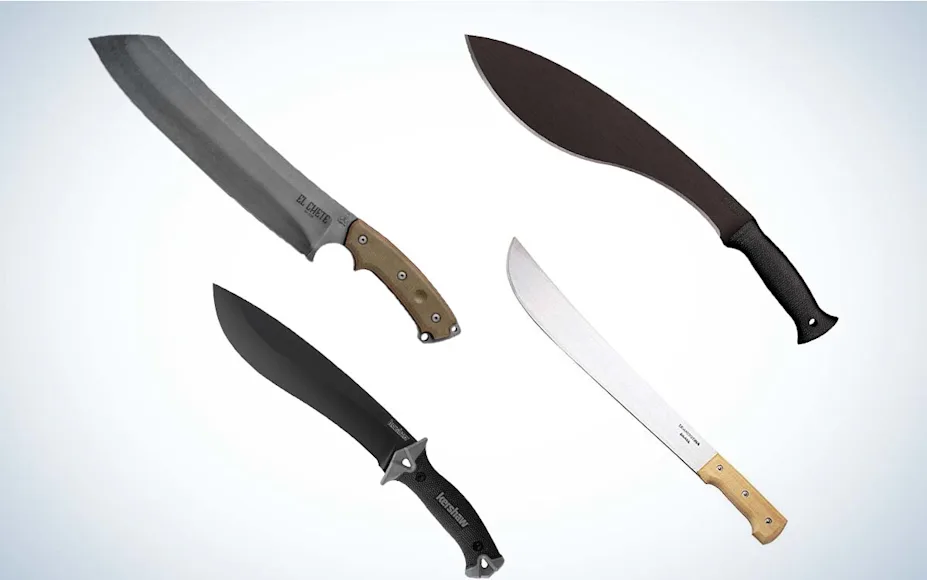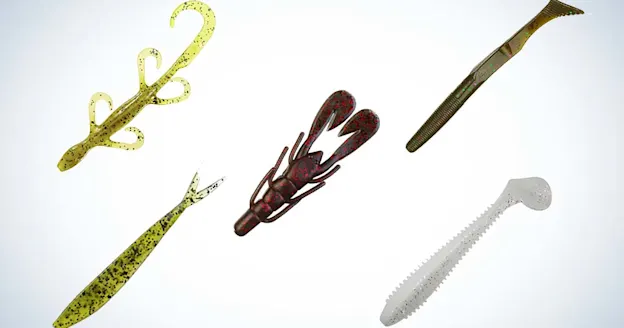We may earn revenue from the products available on this page and participate in affiliate programs. Learn more ›
Machetes have a home in the garden as well as the forest, though that largely depends upon what you’re growing. They are popular tools for those who spend considerable time outdoors and they can certainly be fun to use. The machete can even be a formidable self-defense weapon if push comes to shove.
You want a machete that will do the job effectively and efficiently, without breaking the bank, or your arm, in the process. They come in various shapes and sizes, so you have plenty of options from which to choose. Read on to find the best machetes for a variety of purposes.
Best Kukri: Cold Steel Kukri
Best for Camping: Kershaw Camp 10
Best for Survival: TOPS Knives El Chete
Best for Clearing Brush: Tramontina Bush Machete
How We Picked The Best Machetes
I am an unabashed self-professed “knife guy” who has been around blades large and small for well over four decades now. I’ve used hundreds of them over the years, from keychain-sized Swiss Army knives to fishing knives to full-size machetes and more.
There were three main factors that went into play to narrow down the hundreds of different machetes on the market to the ones we included in this guide. These were my criteria:
Quality: It makes very little sense to buy any piece of gear if you know it isn’t well-made. Sure, if you’re in your backyard and the machete bends or breaks, it probably wouldn’t be a big deal. If you’re three days’ walk from the nearest road when it happens, that’s more than a little different.
Design: While many machete designs are rather specific in terms of region of use, such as being best-suited for tropical areas, we wanted to include models here that would be suitable for a wide range of areas. For example, a thin, almost flexible blade that can be used to a great effect in grassy terrain might not be nearly as effective in woody areas.
Price: Sure, higher price tags usually bring higher quality as a general rule. But you don’t need to take out a second mortgage just to buy something for lopping branches and blazing trails. What we tried to do was strike a balance with a reasonable price and great quality components and construction.
Best Machetes: Reviews & Recommendations
Best Kukri: Cold Steel Kukri
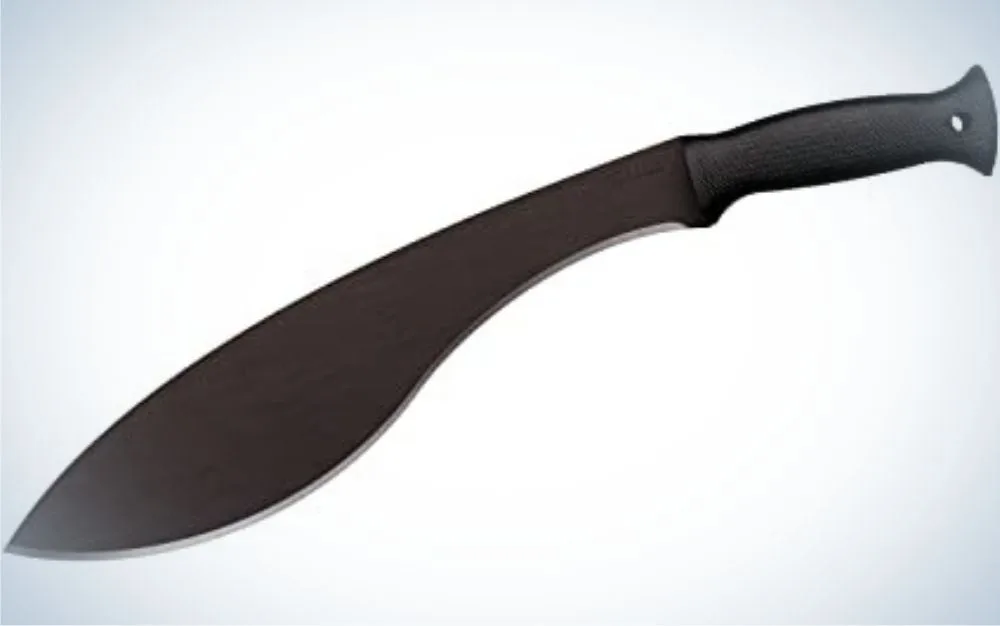
Specs
Blade Length: 13 inches
Weight: 16 ounces
Steel: 1055 carbon steel
Pros
Full tang construction
Comfortable polypropylene handle
Baked on anti-rust finish
Cons
Factory edge can be rough
The kukri is the everyday knife of the Nepalese people, who use it for everything from harvesting crops to chopping firewood. This model from Cold Steel is made to work. It is relatively inexpensive as far as machetes go, and as a result, there aren’t any fancy adornments. That’s not a bad thing as you’re getting exactly what you need, a workhorse, without paying for decoration. Plus, you won’t be afraid to use and abuse it, fearing that you’ll damage the finish or some such.
The forward curve of the blade makes it look as though it will be unbalanced, but that’s not the case at all. It swings very well and it cuts deeply into the target, whether you’re delimbing branches or cutting open a shooting lane just before hunting season begins. It comes with a sturdy sheath that can be worn on the belt if desired.
Cold Steel is well known in the knife industry and they have several models of machetes in their lineup, including the Cold Steel Jungle Machete and the Cold Steel All Terrain Chopper. This Kukri model, though, is exactly what I bought my father-in-law for when he’s making new trails in his forest. He’s been using it for years and loves it.
Best for Camping: Kershaw Camp 10
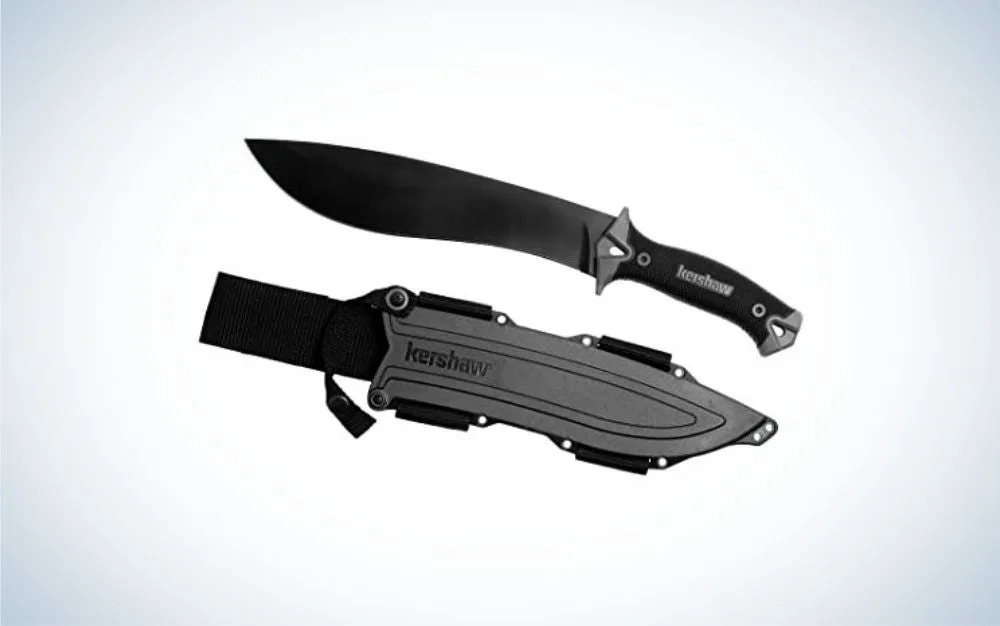
Specs
Blade Length: 10 inches
Weight: 18.3 ounces
Steel: 65Mn carbon steel
Pros
Easy to carry, even on long treks
Black powder coat protects the blade
Full tang construction for strength
Cons
A bit small for heavy-duty work
The Kershaw Camp 10 bridges the gap between a large knife and a small machete, making it perfect for simple chores that don’t require extended reach. But there’s still plenty of heft to lend added power to your swings. Plus, the ergonomics of the design are on point and it is a dream to use, even for extended periods of time. It bears a slight resemblance to the Ka Bar Cutlass Machete, though with a different sort of handle.
The rubberized handle provides plenty of grip. There are lanyards holes at each end of the handle, allowing you to really secure your hand when you’re working. The glass-filled nylon sheath has a belt loop as well as gear straps, giving you several carrying options.
The blade has a slight recurve shape and at the spine measures nearly 0.20-inch thick. This is a strong knife, with plenty of steel to back up each chop and cut. Kershaw has a long-standing reputation for high-quality blades that don’t carry high price tags. With The Camp 10, it hits that sweet spot where you’re getting more than your money’s worth. It is built for the long haul and with even minimal care it should last many years.
Best for Survival: TOPS Knives El Chete
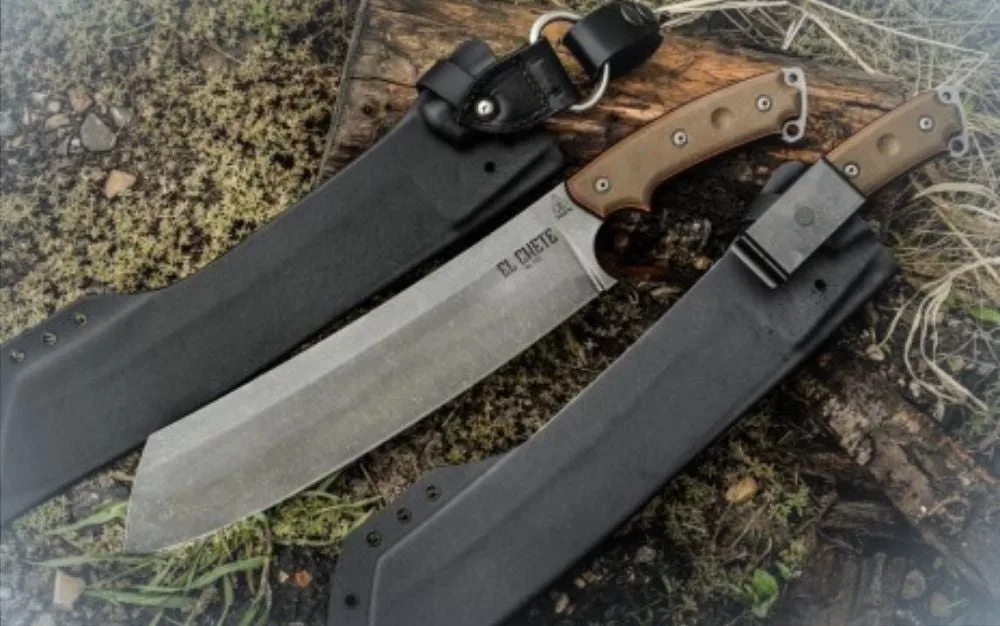
Specs
Blade Length: 12 inches
Weight: 29.5 ounces
Steel: 1095 carbon steel
Pros
Micarta handles add strength and grip
Full 0.25-inch-thick blade
Out-the-front sheath design
Cons
Can be heavy for some users
The El Chete is designed to chop. This is not a delicate tool. It is made to apply raw force to whatever is put in front of it. The foot-long 1095 carbon steel blade is thick and incredibly strong. It is a brutally effective tool for many applications, from chopping firewood to cutting your way through even the thickest forest.
The handle is comprised of black and green Micarta slabs attached to the tang. These are rounded and contoured for comfort. They’re thick and fill the hand well while also providing a secure grip, even in challenging conditions. Even with its heftiness, the El Chete is comfortable to use, with its weight doing much of the work. The sheath is what they call an out-the-front design. Rather than drawing the machete straight up and out, you just pull up it a few inches, then rock it forward and out of the sheath. While this takes a little getting used to, it is a very safe way to deploy the tool.
Best for Clearing Brush: Tramontina Bush Machete
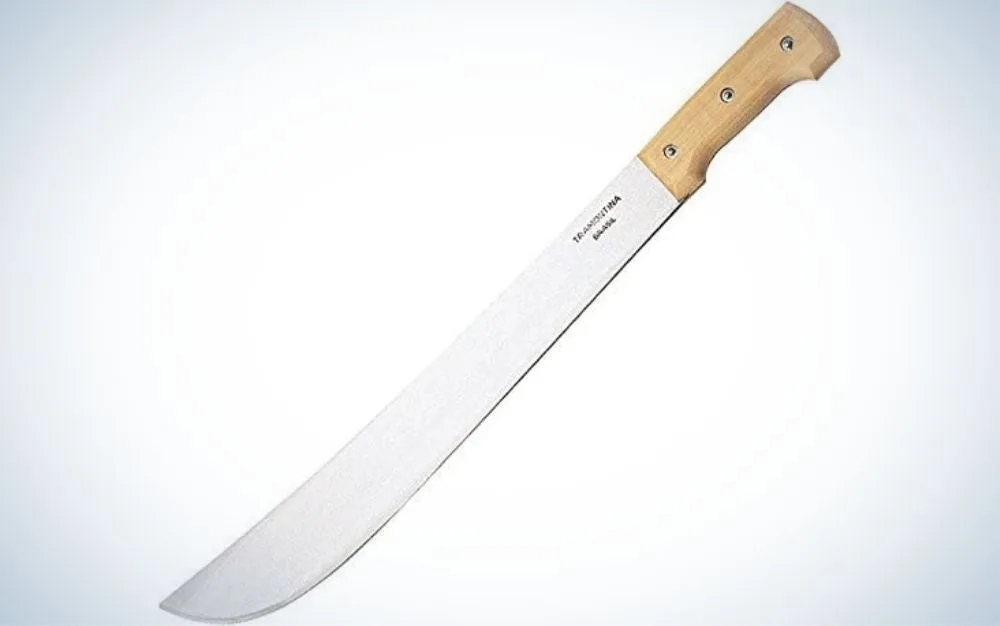
Specs
Blade Length: 18 inches
Weight: 16.2 ounces
Steel: 1070 carbon steel
Pros
Long blade for an increased reach
Durable wooden handle
Traditional design used the world over
Cons
Does not come with a sheath
This is a standard, no-frills machete. No bells or whistles, just 18 inches of carbon steel that will chop and cut through just about anything that’s in your way as you tramp through the forest and field. The low-key approach here isn’t a bad thing, not by any stretch. Keep in mind that people who live in areas where machetes are used daily don’t have a need for polished blades or other such niceties.
The bad news is that the Tramatino Bush Machete doesn’t come with a sheath. You can find one online or you could cobble something together yourself. It doesn’t need to be anything fancy, just something to protect the blade’s edge, and you from it. This model is also a little rough around the edges. Users might find the handle a little more comfortable after applying a layer of grip tape. Adding a lanyard looped around the end of the handle might also be a good idea. Some buyers have found the blade’s edge in need of touching up before the first use. Even so, the price really can’t be beaten.
What to Consider When Choosing a Machete
When it comes to selecting a machete, there are a few considerations to keep in mind. Think about the following considerations before deciding what machete is best for you.
Budget
For most people, the first consideration is their budget. Very few of us have enough disposable income that we can just go out and drop hundreds of dollars on a tool that we might only need for limited use. On the other hand, buying something that’s cheaply made might result in having to replace it often. Fortunately, you can find good quality machetes at a reasonable price. There’s no need to spend a huge amount of money on one.
Environment
A machete made for a tropical environment won’t likely do well in a temperate forest and vice versa. While you can usually make do, if you have the option of choosing something that’s tailor-made for the area you’ll be operating in, all the better. That said, there are plenty of models that bridge both worlds, so to speak, and can be used in most climates without too much trouble.
Construction
Due to the nature of its work, a machete needs to be well-built with quality materials. It will be subjected to repeated poundings and the last thing you want to happen is for the handle to come loose or for the steel to bend or even snap. Look for high-quality steel and durable construction. For example, the handle should be affixed mechanically as well as with an adhesive. The steel should be something that will take an edge and hold it through normal use. You don’t want to have to stop and sharpen it constantly.
Weight
Robust construction comes with an increase in weight. There just isn’t a way around that. A lightweight machete is likely to be more prone to damage under routine use. On the other hand, you’ll be carrying the machete all the time and swinging it frequently, so you don’t want a boat anchor that’s just going to slow you down. Find a balance between durability and weight. It should be ergonomic, or you’ll find reasons not to bring it along.
Couple the best machete with your favorite survival knife and you’ll have all the tools you need to tackle the wilderness.
FAQs
Q: Are machetes legal?
When it comes to blades, there just is no blanket answer as to the legality of carrying them. The user will need to consult state law as well as a municipal ordinance to ensure they do not break any laws.
Q: What are machetes used for?
Machetes are used for clearing brush and shrubbery, as well as trailblazing and even some types of crop harvesting. They can also be useful for those who compost. Old watermelons, pumpkins, and the like can be quickly chopped into pieces before being tossed on the pile. They’ll decompose much quicker that way. Many hunters use machetes to clear shooting lanes. Remember, even the most accurate hunter on the planet needs a clear shot to hit the target.
Q: How should I carry a machete?
It all depends on where you’re headed and what you’re doing. Most machetes are sold with sheaths, typically either leather, nylon, or Kydex. While these sheaths will have a belt loop of some kind, many users find carrying a machete at their waist to be cumbersome and awkward. For this reason, some people will strap the sheath to their backpack, or even just stuff the sheathed machete into the pack itself. The machete is a tool, and like any tool, it isn’t going to be used every moment you’re in the field. You can pack it away as you move and bring it out just when it is needed.
Best Machetes: Final Thoughts
Best Kukri: Cold Steel Kukri
Best for Camping: Kershaw Camp 10
Best for Survival: TOPS Knives El Chete
Best for Clearing Brush: Tramontina Bush Machete
Machetes aren’t a true necessity for everyone. But, if you can afford the best machete and don’t mind carrying it into the field, it is better to have one and not need it than to need it and not have it. Using the machete will save the edge on your survival knife for things like cleaning harvested game and processing wild edibles. Don’t forget to pack your knife sharpener, too.
Why Trust Us
For more than 125 years, Field & Stream has been providing readers with honest and authentic coverage of outdoor gear. Our writers and editors eat, sleep, and breathe the outdoors, and that passion comes through in our product reviews. You can count on F&S to keep you up to date on the best new gear. And when we write about a product—whether it’s a bass lure or a backpack—we cover the good and the bad, so you know exactly what to expect before you decide to make a purchase.

